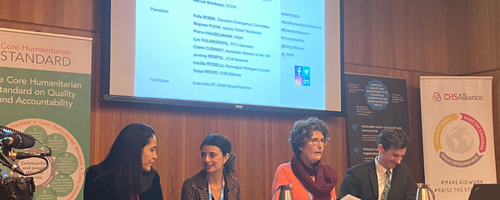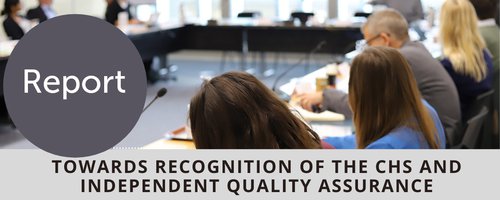HQAI response to IDC report
HQAI's comments on the IDC report on tackling sexual exploitation and abuse within the aid sector
February 2021
HQAI appreciates having had the opportunity to provide input to the work of the Committee and welcomes IDC’s report on the progress on tackling the sexual exploitation and abuse of aid beneficiaries. However, we regret that the report makes a number of statements about HQAI and certification against the Core Humanitarian Standard (CHS) that need clarifying.
We are grateful for the continued momentum that the report has provided in the pursuit of more efficient and effective actions and standards to tackle Sexual Exploitation, Abuse and Harassment (SEAH), and fully support the report’s key findings on the need for aid organisations to:
- address the power imbalances in the sector by empowering people affected by crisis to be involved more directly in aid delivery
- embed safeguarding in all aid programmes
- make sure that reporting mechanisms are designed in collaboration between the aid organisations and the people who will use them
- ensure people receiving aid who are victims or survivors of sexual exploitation and abuse (SEA) have access to support services
However, we regret that the report, in paragraph 86 on pages 28 and 29, makes a number of statements about HQAI and certification against the Core Humanitarian Standard (CHS) that need clarifying, as follows.
Cost of audits
The report states that “audits cost a significant amount of money” without context. HQAI’s audits are thorough. The audit triangulates data from documents and interviews and, importantly, includes feedback from those people on the receiving end of services provided by the organisation being audited. As the IDC report itself points out (in relation to Keeping Children Safe assessments), listening to and learning from such people is critically important: “It is in programme delivery locations that safeguarding concerns regarding ai[d] beneficiaries arise, so it is impossible to assess the effective implementation of safeguarding policies and processes without visiting them.” (93, p31).
It is vital that HQAI auditors have access to a variety of programme sites and talk directly to both staff and “beneficiaries” of aid, an endeavour that typically requires travel to a number of different countries. While this contributes to the cost of the audit, it is necessary if we are to fully understand the context of an organisation’s operations and listen to those people directly impacted by those operations. Indeed, our work is very much in alignment with Sarah Champion MP’s conclusion in the report’s press release: “There is a very simple solution [when it comes to stamping out abuse] that would make a huge difference – speak, listen and engage with people to see what works for them”.
The cost of HQAI’s services are necessarily competitive: we are a not-for-profit NGO and our fees are considerably lower than those charged by the private sector for audits of a similar scale. As an example, when one organisation had HQAI conduct a CHS certification audit and, in parallel, assess the organisation in relation to ECHO partnership requirements, HQAI’s cost for both the CHS certification audit and the “bridge" to ECHO’s due diligence audit amounted to 65% of the quote by the organisation’s statutory auditor for the ECHO audit alone.
Oxfam’s CHS certification
HQAI certified Oxfam’s humanitarian operations against the CHS in 2018, and the IDC report cites the Independent Commission on Sexual Misconduct, Accountability and Culture Change (IC) report published in July 2019. As the IDC report states, the IC report found that although Oxfam had taken steps to combat sexual abuse and other forms of misconduct, “a complete overhaul of its confederation system” was still required.
The IC report also noted that our audit found weaknesses in Oxfam’s accountability systems and highlighted the role of the HQAI audit in ensuring Oxfam “is working to disseminate its safeguarding commitments to program participants, has developed guidance on establishing community feedback mechanisms, and is now introducing innovative solutions to collecting and reporting feedback that may serve as an entry point for capturing and referring reports of misconduct.” (p19). Indeed, the IC report recommended, on page 55, that Oxfam deepen its engagement with HQAI’s auditing services, with a suggested expansion in scope to include its development operations. To date, HQAI has certified Oxfam’s humanitarian work against the CHS, requisite to which is a rigorous annual review process.
Quote from FCDO
It is disappointing that the full quote from FCDO’s Peter Taylor’s oral evidence to the IDC on this issue was not included in the report, as he makes it clear that the UK government (or FCDO) has full confidence in the rigour of HQAI’s CHS audits. He told the committee: “HQAI is verifying adherence to the CHS standard and the donors have said, 'We expect partners to adhere to one of two sets of standards, or both’, one of which is the CHS standard. If an organisation is certified by HQAI, there is a very strong likelihood that they are meeting the standards we require. Having said that, it will depend, of course, on when that work took place.”
Unfortunately, the use of selective quotes in the IDC report provides a misleading account of the services HQAI provides. We therefore respectfully request that these clarifications be noted by the IDC and this response published on their website.
As the report notes: while positive steps have been made by the aid sector to hold organisations to account, much more must be done to ensure respect for the rights and dignity of vulnerable people. In close collaboration with its strategic partners, including governments and the aid sector at large, HQAI continues to conduct independent audits against the CHS in order to help organisations continually and effectively improve the quality of their services and promote accountability to people affected by crisis.
HQAI welcomes the opportunity to give further information on the above and answer any follow-up questions that the committee should have.
You might be interested in
Category


